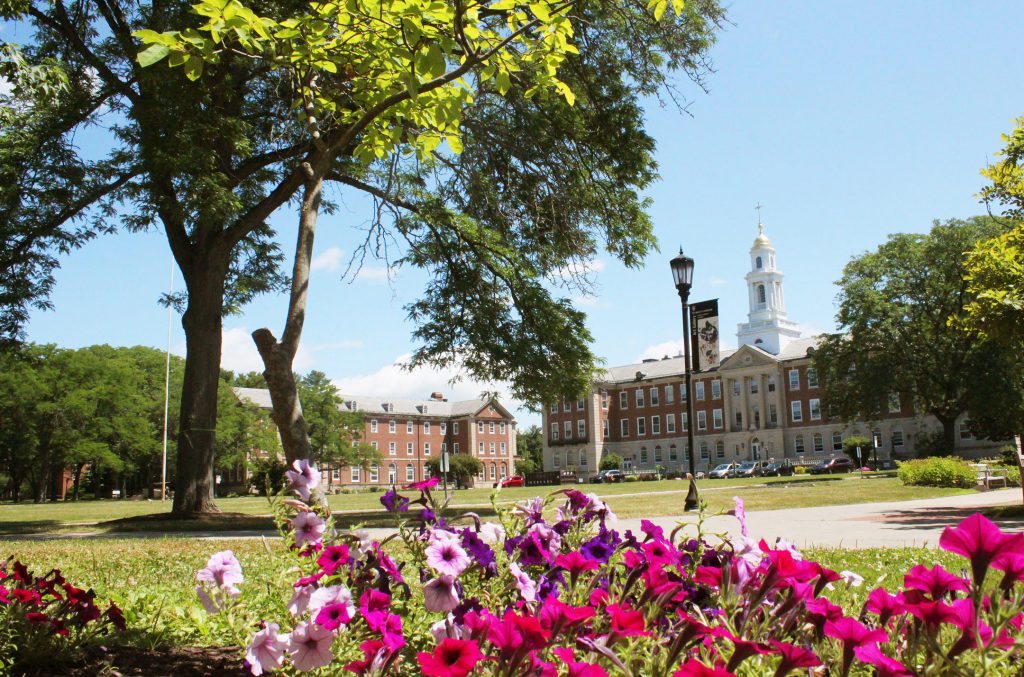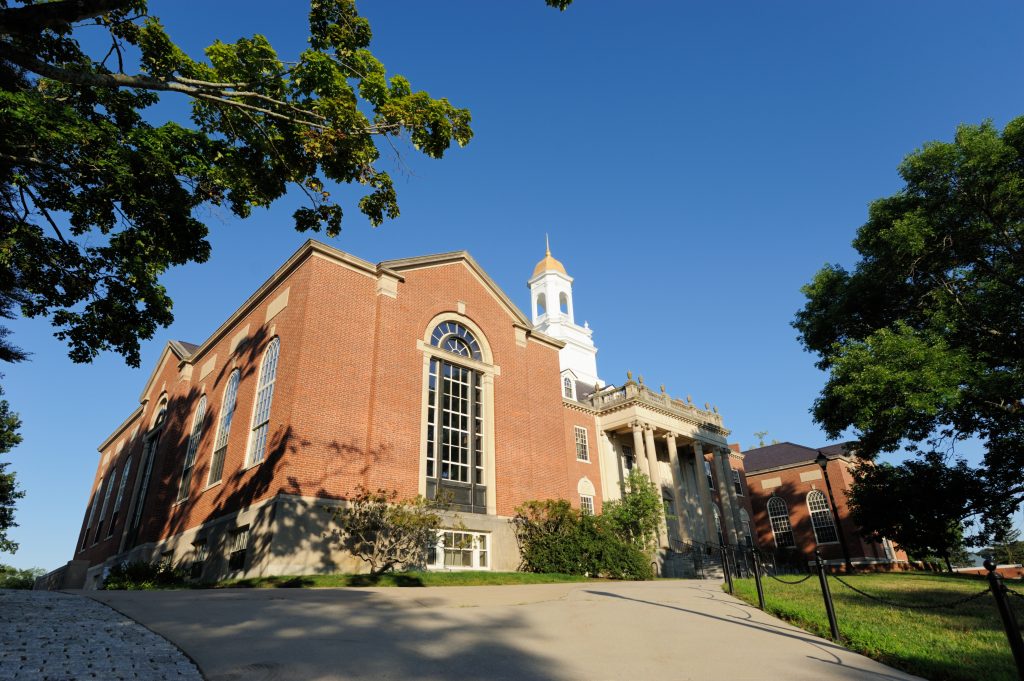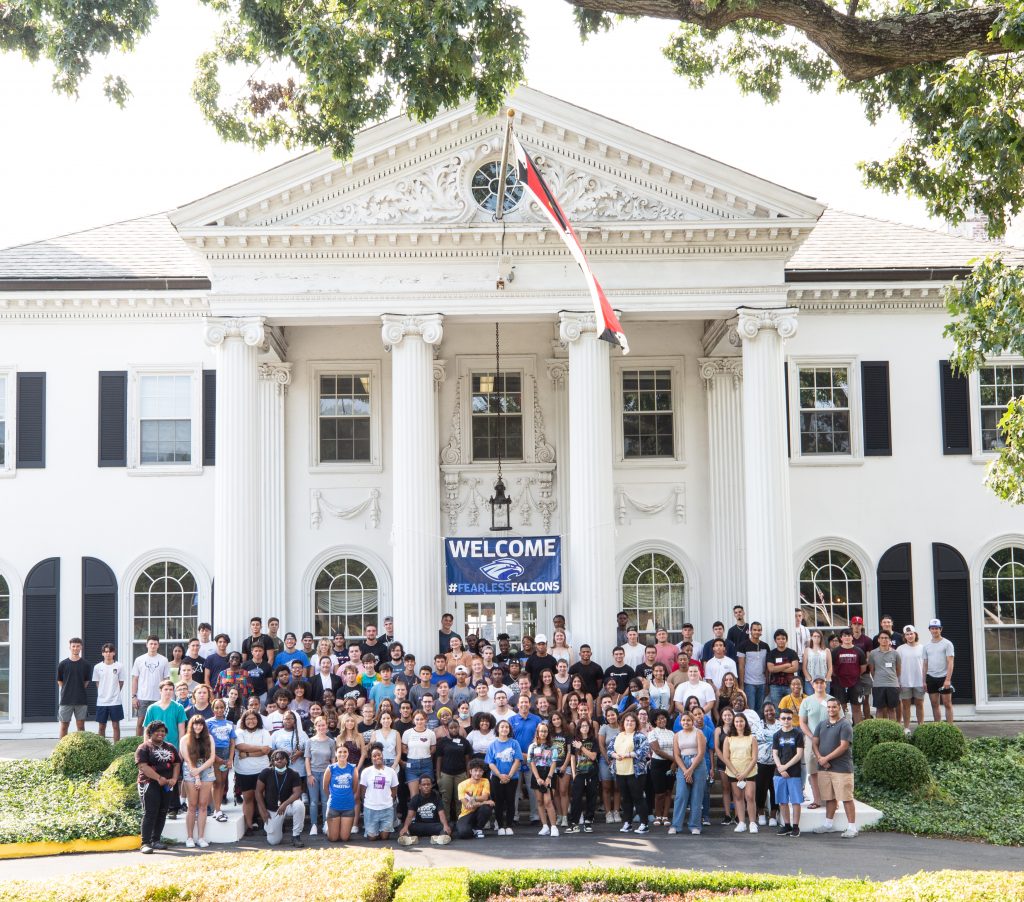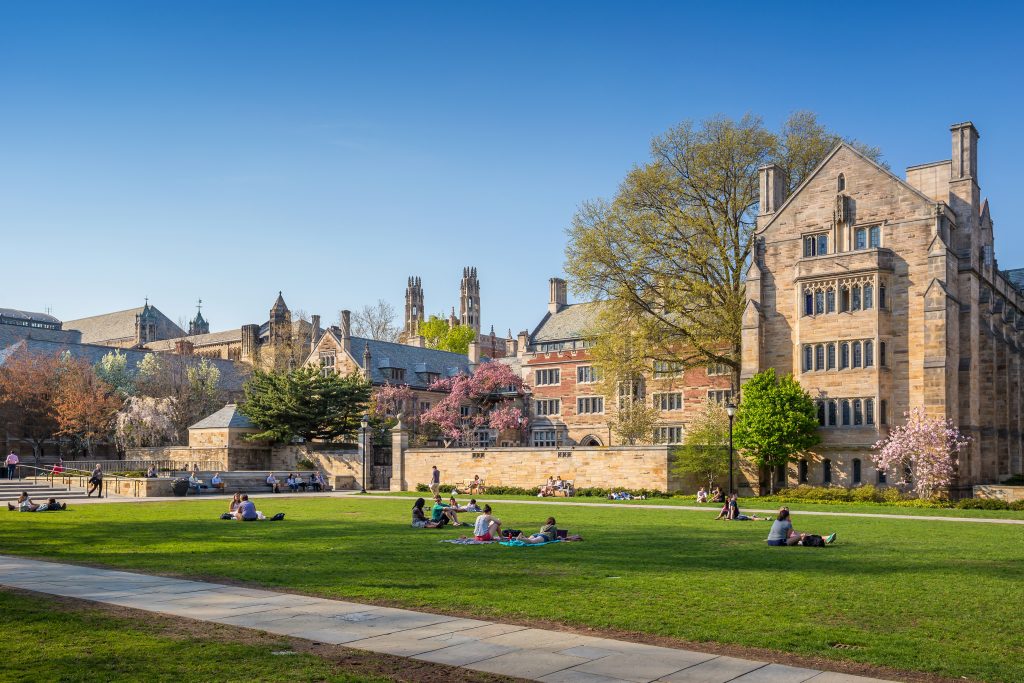By DAWN ENNIS
What Connecticut high school graduates—and their parents—need to know
Juniors and seniors at high schools across the state are preparing for the biggest changes in their lives since surviving puberty and learning how to drive: what comes next after graduation?
For some, it will be learning a trade or shipping off to serve their country. But for most students who have a cap and gown in their future, college will be the next step. Affording that step could send teenagers into a world of tremendous debt and/or plunging their parents even deeper down that spiral.
Six of Connecticut’s top institutions of higher learning shared their insights and offerings for Fall 2023, from scholarships and awards to the support for students and families overwhelmed by it all: Yale University, University of Connecticut, Southern Connecticut State University, University of Hartford, St. Joseph’s University and Albertus Magnus College.
Yale University, although it may be the most famous and prestigious school in the state, actually is not the most expensive. A 2022 survey found Connecticut College and Wesleyan charge thousands more in tuition. And although Southern Connecticut State University is the least expensive of the universities surveyed here, there are even more affordable options in the state’s community college network worth considering for those on a tight budget.
Each of these six institutions offers programs ranging from merit-based to financial hardship, memorial, alumni and corporate-sponsored scholarships that can offset the expense in large and small ways, including some that will, in fact, provide a full, tuition-free ride. What’s important to note is that these are not loans; scholarships and grants do not need to be repaid.
Here are the options for scholarships at these six schools, as presented by their representatives and online portals. Check out the sidebar for a look at what universities and colleges offer in terms of mental health support, an important consideration in these stressful times.
Southern Connecticut State University
Through the generosity of alumni, parents and friends of the university, the Southern Connecticut State University (SCSU) Foundation manages over 400 scholarships that are available to both undergraduate and graduate students at its New Haven campus.
“We have a plethora of scholarship opportunities for both continuing students, which would be that student who’s returning, and new students,” said Nilvio Perez, director of first-year admissions at SCSU. “We have one set that’s called Foundation Scholarships, which are scholarships that are fundraised for, and often earmarked. So, for example, the College of Education will have several different scholarships under their Foundation bracket, which will only go to certain education majors.”
“New students can still apply for those Foundation Scholarships, but the majority of new students will get a scholarship through one of the admissions offices here, whether it’s a first-year transfer or graduate, and those are typically referred to as trustee scholarships,” continued Perez. “Students will need a certain academic grade point average, and those scholarships are renewable from year to year, so long as they maintain a certain academic standard.”
Perez said SCSU has many corporate partners offering scholarships, including the New Haven Chamber of Commerce and the Community Foundation for Greater New Haven, among others, as well as partners offering internships and job placement, including Webster Bank, Yale New Haven Hospital and more.
“In addition to that, there are what I like to call ‘talent-based scholarships. So, the athletic department may offer a student athlete a scholarship,” he added. “We have the Stutzman Family Foundation scholarship for music, where students audition to get a scholarship. So, we have other kind of talent-based scholarships at the university as well. And then the Foundation Group has everything from academic interest to community service or leadership, to various diversity ones, whether it’s first generation, identifying with a certain ethnic group, or being from a certain town or city. So, there’s a lot of different scholarships within Foundation.”
University of Hartford
The University of Hartford (UHart) in West Hartford awards over $95 million in scholarships and grants each year, including scholarships that can reach up to full tuition for academic merit, artistic talent and performance, and program-specific interests. Additionally, students who are eligible for the highest tier of academic scholarships are invited to an annual full-tuition scholarship competition.
“All full-time applicants are automatically reviewed for an academic-based scholarship at their time of admission. These range from $22,000-$31,000 per year,” said Katherine Presutti, UHart’s director of student financial aid. “All full-time students who completed a FAFSA are reviewed for need-based grant funds institutionally, and at the state and federal level.
“We created the Connecticut Pledge Scholarship a few years ago for families whose total income is under $50,000 that live in the state of Connecticut. We offer Hartford and Bloomfield Scholarships to students who live and go to high school in the cities of Hartford and Bloomfield. We offer a Family Grant for siblings who are both attending full-time. We offer ‘involvement’ scholarships as well,” added Presutti. “To name a couple: DECA [Distributive Education Clubs of America] and FIRST [For Inspiration and Recognition of Science and Technology] Robotics.
“All aid is renewed as long as the student maintains minimum academic standards and need levels for need-based aid. We also have a university scholarship portal that helps match students to donor-based funds they may be eligible for. This is mostly reserved for second-, third- and fourth-year students. For first-year students, we always direct students to work with their school counseling office at their high schools for local-based scholarships as well. In most cases, this just helps to bring down the students bottom line,” she said.
Also new this year is the Be a Force for Good Scholarship initiative. It will provide a total of $600,000 in scholarships over four years to UHart’s Stanley Black & Decker Scholars, focusing on students under-represented in business, including first-generation and BIPOC college students. Scholars will receive up to $10,000 toward their UHart education each year from Stanley Black & Decker. Pratt & Whitney has also provided scholarships to mechanical engineering students in UHart’s College of Engineering, Technology, and Architecture since 2019.

University of St. Joseph
From merit scholarships to university, state and federal grants, the Catholic-run University of St. Joseph (USJ) in West Hartford offers a variety of university and external scholarships and grants.
“At St. Joe’s, we awarded $17.5 million in institutional aid. So that’s money that comes from the university,” said Maggie Pinney, vice president for institutional advancement at USJ, and an alumna of the Class of 1995. Her job is to raise money for USJ’s scholarships.
“Some of those scholarships have specific criteria around them, like they might be awarded to students in a particular academic program,” she said. “I work with donors pretty frequently who say, ‘Well, I’d like to set up a scholarship and I want the award to go to a student studying biology,’ or nursing or education or whatever the case may be. We do have some scholarships that have other criteria that are not just academic programs. Sometimes those are geographic. Like a donor will say, ‘I want to set up a scholarship that will assist a student from Granby or Hartford or in a particular town.”
USJ also offers scholarships for first-generation college goers. “That’s something that a lot of donors care a lot about,” Pinney stated. “We have a number of scholarships that are intended to make us a more diverse and inclusive community.”
Not all of USJ’s scholarships are dedicated to helping those needing financial aid, said Pinney, “But most of our scholarships are need-based.”
As a leader in educating nurses, USJ also has scholarships funded by corporate partners.
“CVS provides us with three scholarships a year. One is for any student in the pharmacy program. One is for a student in the pharmacy program who is a Spanish speaker, and one is for a student in our family nurse practitioner program,” Pinney said. “And then Walgreens also provides scholarship aid for students in our pharmacy program, to expand diversity in the pharmacy ranks, to have a more diverse workforce.”
As a fundraiser, Pinney also has to contend with donors with very specific interests.
“If you talk to someone who does what I do, we all hear horror stories of someone who set up an endowed scholarship 95 years ago, and it’s for a left-handed oboe player from Des Moines! And then a college can’t ever award it because they don’t get a candidate that fits those criteria. So, for most of us who are doing this, who are in advancement these days, our first responsibility is to meet the needs of the university and, in conjunction with that, to honor the wishes of the donor. But in general, we are trying to talk with our donors about putting as few restrictions on the scholarships as possible, because it allows the university to meet the needs of the students who are in the application pool,” she said. “We always ask our donors, if there’s not an appropriate candidate, can it be awarded to any student with financial need? We try to build-in a lot of flexibility, and I almost can’t think of a donor who has not agreed to do that.”

University of Connecticut
Given University of Connecticut’s (UConn) huge enrollment of more than 32,000 students on its Storrs campus, it should come as no surprise its list of available scholarships is also humungous. Here’s what is available to undergraduates.
The College of Agriculture, Health and Natural Resources, School of Business, School of Engineering, School of Nursing, School of Pharmacy, the Ratcliffe Hicks School of Agriculture, the School of Fine Arts all offer scholarships.
The Women’s Center provides the 100 Years of Women Scholarship. There is also the Werth Innovators Leadership Development scholarship, Merit Scholarships, the Presidential Enrichment Award and the U.S. Department of Education scholarship.
UConn’s Office of National Scholarships and Fellowships (ONSF) offers the Rhodes, Marshall, Mitchell, Churchill, Beinecke, Goldwater, Udall, Truman and Gaither Junior Fellows competitions. They also extend those that incorporate some form of institutional endorsement or review into their selection processes, including the U.S. Student Fulbright grants, the NSEP Boren Scholarships and the Schwarzman Scholars program.
The Neag School of Education offers the Global Education Scholarship, Schoolwide Scholarships, Teacher Education Scholarships, the Department of Curriculum and Instruction Scholarships, the Department of Educational Leadership Scholarships, and the Department of Educational Psychology Scholarships as well as an Alumni Board Scholarship.
UConn’s College of Liberal Arts and Sciences gives merit- and need-based scholarships.
The university’s Department of Experiential Global Learning offers its own UConn Experiential Global Learning Scholarships, UConn Global Affairs Foundation Scholarships, National Scholarships, Destination Scholarships and Diversity Scholarships.

Albertus Magnus College
Located in New Haven, this Catholic-run institution offers what it calls the Albertus guarantee: “You Invest in Four Years. We Invest in You.” Students receive a minimum of $40,000 in merit scholarships.
The Albertus guarantee, according to Andrea Kovacs, the vice president for enrollment management and marketing at Albertus Magnus College, amounts to $10,000 a year.
“We give a lot because we tend to serve often a first-generation or high-needs student. And for those families, they probably don’t have the resources at the ready or they’ve not had the privilege of being able to plan for 18 years for this student to go to college. Or if they did plan for 18 years, it’s probably not enough. And so, we reward achievement,” she said.
Their presidential scholarship is as high as $25,000 a year, Kovacs added. “Obviously, that’s the top-level achieving student rate, but it can be as high as that, and that’s one scholarship. We give additional grant money to students to help them to be able to afford to live on campus, because we know they’re going to be more successful if they do that.”
There’s also a hardship scholarship for juniors and seniors who may be considering dropping out when there’s a family emergency impacting their budget. “Micro grants is what I would call them. I think they’re up to $10,000 or $20,000,” she said. “And you can only get it once, but it helps that student over that unexpected hump that might have caused them to drop out of school.”
Kovacs said Albertus has about 500 or more corporate and nonprofit partners throughout Connecticut.

Yale University
Yale calls scholarships and other grants “gift aid,” because they do not need to be repaid.
Such gift aid falls into one of three categories in the Yale financial aid award: The Yale Scholarship, merit-based scholarships and entitlement grants.
The Yale Scholarship can vary from a few hundred dollars to over $70,000 per year; the average Yale need-based scholarship is over $50,000.
While Yale does not award merit-based scholarships, Yale students often qualify for merit awards from other organizations. Criteria for receiving merit scholarships are directly linked to a student’s performance in academics, sports, music or another field of special interest. Potential sources for merit-based awards include private companies, employers and nonprofit organizations.
Entitlement grants are awarded by the federal government, state agencies or other agencies not affiliated with Yale. The criteria for receiving entitlements are based on federal need, city or state of residence, or affiliation with an employer. An entitlement grant may have a merit component, but if the student would not receive the resource without need, the resource is generally considered an entitlement.
Examples of entitlement grants include federal Pell Grants, Federal Supplemental Educational Opportunity Grants, state grants and employer tuition benefits, as well as Yale Club or Association Scholarships. Entitlement grants reduce Yale Scholarship funds dollar for dollar.
The bottom line for Connecticut families: “Don’t let your kid slack off in the spring. I mean, everyone gets senioritis,” Kovacs said. “If you are a B, C student, you really want to keep your foot on the gas, right up to the end.”
Kovacs also noted students may find a scholarship that fits their unique or unusual skills, backgrounds, or interests by looking beyond the obvious. “Don’t just go by what’s printed in the brochure or what appears on the website. Ask the admission counselor, ‘Is there anything else I might qualify for?’.” That money is out there, waiting for you to find it.








More Stories
Goodbye Summer, Hello School
Exploring the Shift in Parental Support During Adolescence
Beyond the Classroom